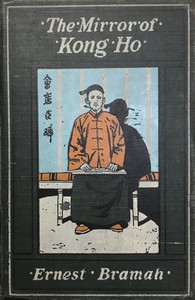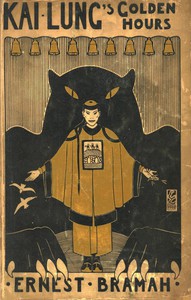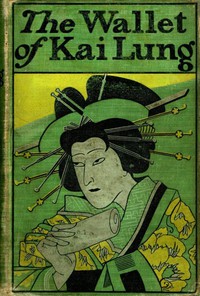The Mirror of Kong Ho by Ernest Bramah (big screen ebook reader .TXT) 📗

- Author: Ernest Bramah
Book online «The Mirror of Kong Ho by Ernest Bramah (big screen ebook reader .TXT) 📗». Author Ernest Bramah
“What Ho?” exclaimed the somewhat impetuous one by my side, stepping forward indignantly and mounting the platform in his affectionate zeal. “No one shall pass over my old and valued friend—this Ho—while I have a paw to raise. Step forward, Mandarin, and let them behold the inventor and sole user of the justly far-famed G. R. Ko-Ho hair restorer—sent in five guinea bottles to any address on receipt of four penny stamps—as he appeared in his celebrated impersonation of the human-faced Swan at Doll and Edgar’s. Come on, oh, Ho!”
“Assuredly,” I replied, striving to follow him, “yet with the wary greeting, ‘Slowly, slowly; walk slowly,’ engraved upon my mind, for the barrier of these convoluted stairs—” but at this word a band of maidens passed out hastily, and in the tumult I reached the dais and began Weng Chi’s immortal verses, entitled “The Meandering Flight,” which had occupied me three complete days and nights in the detail of rendering the allusions into well-balanced similitudes and at the same time preserving the skilful evasion of all conventional rules which raises the original to so sublime a height.
The voice of one singing at the dawn;
The seven harmonious colours in the sky;
The meeting by the fountain;
The exchange of gifts, and the sound of the processional drum;
The emotion of satisfaction in each created being;
This is the all-prominent indication of the Spring.
The general disinclination to engage in laborious tasks;
The general readiness to consume voluminous potions on any pretext.
The deserted appearance of the city and the absence of the come-in motion at every door;
The sportiveness of maidens, and even those of maturer age, ethereally clad, upon the shore.
The avowed willingness of merchants to dispose of their wares for half the original sum.
This undoubtedly is the Summer.
The yellow tea leaf circling as it falls;
The futile wheeling of the storm-tossed swan;
The note of the marble lute at evening by the pool;
The immobile cypress seen against the sun.
The unnecessarily difficult examination paper.
All these things are suggestive of the Autumn.
The growing attraction of a well-lined couch.
The obsequious demeanour of message-bearers, charioteers, and the club-armed keepers of peace.
The explosion of innumerable fire-crackers round the convivial shrines,
The gathering together of relations who at all other times shun each other markedly.
The obtrusive recollection of a great many things contrary to a spoken vow, and the inflexible purpose to be more resolute in future.
These in turn invariably attend each Winter.
It certainly had not presented itself to me before that the words “invariably attend” are ill-chosen, but as I would have uttered them their inelegance became plain, and this person made eight conscientious attempts to soften down their harsh modulation by various interchanges. He was still persevering hopefully when he of chief authority approached and requested that the one who was thus employed and that same other would leave the hall tranquilly, as the all-water entertainment was at an end, and an attending slave was in readiness to extinguish the lanterns.
“Yet,” I protested unassumingly, “that which has so far been expressed is only in the semblance of an introductory ode. There follow—”
“You must not argue with the Chair,” exclaimed another interposing his voice. “Whatever the Chair rules must be accepted.”
“The innuendo is flat-witted,” I replied with imperturbable dignity, but still retaining my hold upon the rail. “When this person so far loses his sense of proportion as to contend with an irrational object, devoid of faculties, let the barb be cast. After that introduction dealing with the four seasons, the twelve gong-strokes of the day are reviewed in a like fashion. These in turn give place to the days of the month, then the moons of the year, and finally the years of the cycle.”
“That’s fair,” exclaimed the perverse though well-meaning youth, whom I was beginning to recognise as the cause of some misunderstanding among us. “If you don’t want any more of his poem—and I don’t blame you—my pal Ho, who is one of the popular Flip-Flap Troupe, offers to do some trick cycle-riding on his ears. What more can you expect?”
“We expect a policeman very soon,” replied another severely. “He has already been sent for.”
“In that case,” said the one who had so persistently claimed me as an ally, “perhaps I can do you a service by directing him here”; and leaving this person to extricate himself by means of a reassuring silence and some of the larger silver pieces of the Island, he vanished hastily.
With some doubt whether or not this deviation into the society of the professedly virtuous, ending as it admittedly does in an involvement, may not be deemed ill-starred; yet hopeful.
KONG HO.
Related by Kong Ho on the occasion of the all-water disportment, under the circumstances previously set forth.
Beyond the limits of the township of Yang-chow there dwelt a rich astrologer named Wei. Reading by his skilful interpretation of the planets that he would shortly Pass Above, he called his sons Chu, Shan, and Hing to his side and distributed his wealth impartially among them. To Chu he gave his house containing a gold couch; to Shan a river with a boat; to Hing a field in which grew a prolific orange-tree. “Thus provided for,” he continued, “you will be able to live together in comfort, the resources of each supplying the wants of the others in addition to his own requirements. Therefore when I have departed let it be your first care to sacrifice everything else I leave, so that I also, in the Upper Air, may not be left destitute.”
Now in addition to these three sons Wei also had another, the youngest, but one of so docile, respectful, and self-effacing a disposition that he was frequently overlooked to the advantage of his subtle, ambitious, and ingratiating brothers. This youth, Kao, thinking that the occasion certainly called for a momentary relaxation of his usual diffidence, now approached his father modestly, and begged that he also might be included to some trivial degree in his bounty.
This reasonable petition involved Wei in an embarrassing perplexity. Although he had forgotten Kao completely in the division, he had now definitely concluded the arrangement; nor, to his failing powers, did it appear possible to make a just allotment on any other lines. “How can a person profitably cut up an orange-tree, a boat, an inlaid couch, or a house?” he demanded. “Who can divide a flowing river, or what but unending strife can arise from regarding an open field in anything but its entirety? Assuredly six cohesive objects cannot be apportioned between four persons.” Yet he could not evade the justice of Kao’s implied rebuke, so drawing to his side a jade cabinet he opened it, and from among the contents he selected an ebony staff, a paper umbrella, and a fan inscribed with a mystical sentence. These three objects he placed in Kao’s hands, and with his last breath signified that he should use them discreetly as the necessity arose.
When the funeral ceremonies were over, Chu, Shan, and Hing came together, and soon moulded their covetous thoughts into an agreed conspiracy. “Of what avail would be a boat or a river if this person sacrificed the nets and appliances by which the fish are ensnared?” asked Shan. “How little profit would lie in an orange-tree and a field without cattle and the implements of husbandry!” cried Hing. “One cannot occupy a gold couch in an empty house both by day and night,” remarked Chu stubbornly. “How inadequate, therefore, would such a provision be for three.”
When Kao understood that his three brothers had resolved to act in this outrageous manner he did not hesitate to reproach them; but not being able to contend against him honourably, they met him with ridicule. “Do not attempt to rule us with your wooden staff,” they cried contemptuously. “Sacrifice IT if your inside is really sincere. And, in the meanwhile, go and sit under your paper umbrella and wield your inscribed fan, while we attend to our couch, our boat, and our orange-tree.”
“Truly,” thought Kao to himself when they had departed, “their words were irrationally offensive, but among them there may stand out a pointed edge. Our magnanimous father is now bereft of both comforts and necessities, and although an ebony rod is certainly not much in the circumstances, if this person is really humanely-intentioned he will not withhold it.” With this charitable design Kao build a fire before the couch (being desirous, out of his forgiving nature, to associate his eldest brother in the offering), and without hesitation sacrificed the most substantial of his three possessions.
It here becomes necessary to explain that in addition to being an expert astrologer, Wei was a far-seeing magician. The rod of unimpressionable solidity was in reality a charm against decay, and its hidden virtues being thus destroyed, a contrary state of things naturally arose, so that the next morning it was found that during the night the gold couch had crumbled away into a worthless dust.
Even this manifestation did not move the three brothers, although the geniality of Shan and Hing’s countenances froze somewhat towards Chu. Nevertheless Chu still possessed a house, and by pointing out that they could live as luxuriantly as before on the resources of the river and the field and the tree, he succeeded in maintaining his position among them.
After seven days Kao reflected again. “This avaricious person still has two objects, both of which he owes to his revered father’s imperishable influence,” he admitted conscience-stricken, “while the being in question has only one.” Without delay he took the paper umbrella and ceremoniously burned it, scattering the ashes this time upon Shan’s river. Like the rod the umbrella also possessed secret virtues, its particular excellence being a curse against clouds, wind demons, thunderbolts and the like, so that during the night a great storm raged, and by the morning Shan’s boat had been washed away.
This new calamity found the three brothers more obstinately perverse than ever. It cannot be denied that Hing would have withdrawn from the guilty confederacy, but they were as two to one, and prevailed, pointing out that the house still afforded shelter, the river yielded some of the simpler and inferior fish which could be captured from the banks, and the fruitfulness of the orange-tree was undiminished.
At the end of seven more days Kao became afflicted with doubt. “There is no such thing as a fixed proportion or a set reckoning between a dutiful son and an embarrassed sire,” he confessed penitently. “How incredibly profane has been this person’s behaviour in not seeing the obligation in its unswerving necessity before.” With this scrupulous resolve Kao took his last possession, and carrying it into the field he consumed it with fire beneath Hing’s orange-tree. The fan, in turn, also had hidden properties, its written sentence being a spell against drought, hot winds, and the demons which suck the nourishment from all crops. In consequence of the act these forces were called into action, and before another day Hing’s tree had withered away.
It is said with reason, “During the earthquake men speak the truth.” At this last disaster the impious fortitude of the three brothers suddenly gave way, and cheerfully admitting their mistake, each committed suicide, Chu disembowelling himself among the ashes of his couch, Shan sinking beneath the waters of his river, and Hing hanging by a rope among the branches of his own effete orange-tree.
When they had thus fittingly atoned for their faults the imprecation was lifted from off their possessions. The couch was restored by magic art to its former condition, the boat was returned by a justice-loving person into whose hands it had fallen lower down the river, and the orange-tree put out new branches. Kao therefore passed into an undiminished inheritance. He married three wives, to commemorate the number of his brothers, and had three sons, whom he called Chu, Shan, and Hing, for a like purpose. These three all attained to high office in the State, and by their enlightened morals succeeded in wiping all the discreditable references to others bearing the same names from off the domestic tablets.
From this story it will be seen that by acting virtuously, yet with an observing discretion, on all occasions, it is generally possible not only to rise to an assured position, but at the same time unsuspectedly to involve those who stand in our way in a just destruction.
Concerning a state of





Comments (0)